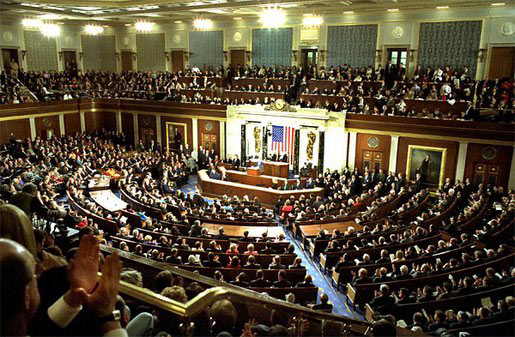
The concerns of most Americans who find it harder and harder to make ends meet, and who want to bring our troops home from Iraq, were ignored by George W. Bush in his State of the Union address. As if the 2006 elections to change the countrys direction had never happened, Bushs proposals only represented the interests of his narrow base, the haves and the have mores.
When he acknowledged Nancy Pelosi, first woman speaker of the House, Bush omitted her leadership in the 100-hour economic response to working peoples needs. The bills passed in 42 hours after a flood of calls, e-mails, grassroots rallies and local events around the country.
This grassroots pressure to realize the elections mandate for peace and economic security was reflected in the unusually strong responses to the State of the Union by Sen. Jim Webb (D-Va.) and by Rep. Xavier Becerra (D-Calif.), who delivered the first Spanish-language Democratic response.
In his address, Bush celebrated a strong economy. In their responses, Webb and Becerra asked, Strong for whom? They argued it is strong for the CEOs whose worth skyrocketed in the past six years, but not for the 37 million in poverty, the 47 million with no health care or the millions of industrial workers whose companies have left town for higher profits elsewhere.
Bush made no mention of the victims of Katrina, or of any program to rebuild the Gulf Coast or eliminate poverty.
In his address, Bush rationalized the war in Iraq, and raised the specter of terrorist attacks to justify sending more troops. In their responses, Webb and Becerra cited generals, officials and the public who disagree.
Bushs saber-rattling and his arguments for more troops and a permanent war policy ignored the many legislative solutions introduced this month by members of the congressional Out of Iraq Caucus and their colleagues, including some Republicans, who are responding to the anger of the voters.
It is very significant that some members of Congress will defy Bushs State of the Union appeal and march with the thousands of people converging on Washington Jan. 27 to call for an end to the war, and welcome antiwar lobbyists Jan. 29.
Bushs domestic program also fails the majority of Americans. By calling for a balanced budget with no tax increases and higher military spending, Bush is protecting his ultra-rich base while insuring that fewer resources will be available for health care, education or alternative energy.
Bushs tax proposal for health care would boost private insurers, but provide little for those without coverage. His proposal to reform meaning privatize Medicare, Medicaid and Social Security would permanently escalate the crisis. The national movement for health care as a basic human right was left out of the State of the Union, including HR 676 to expand and improve Medicare for universal coverage.
Bushs support for school vouchers would give public monies to private education corporations and undermine the public education system. His support for guest worker programs would create an unequal, second-class group of immigrant workers forced to live apart from their families. Only the corporations would gain.
A State of the Union in the interests of working people would be far different. It would highlight the Employee Free Choice Act, with 225 co-sponsors, which restores workers right to organize into unions free from employer intimidation and coercion.
It would encompass the broad civil rights agenda including full funding and improvement of No Child Left Behind before re-authorization. It would include ending and rolling back repressive measures against immigrants and legalization with full labor and civil rights and a rapid path to permanent residency and citizenship. It would call for a new foreign and military policy based on international cooperation and nuclear disarmament.
Bushs leverage on Congress is greatly diminished since the elections. Some moderate and conservative Democrats may respond to the President on some issues. But overall, the majority of committees and subcommittees are chaired by members of the Congressional Progressive, Black, Hispanic, Asian Pacific and Womens Caucuses.
The success of the 110th Congress in standing up to George W. Bush will depend largely on the amount of pressure and support from below.
Union members, African American, Latino, women and youth voters were at the core of mobilizing the historic vote that defeated the right-wing stranglehold on Congress in 2006. In 2007 these forces, joined by many others, hold in their hands the State of the Union, for a new direction looking toward 2008, that puts peoples needs first.
Joelle Fishman (joelle.fishman@pobox.com) is the chair of the Communist Partys political action commission.
This article was published in the People’s Weekly World Newspaper, www.pww.org

 Join Now
Join Now